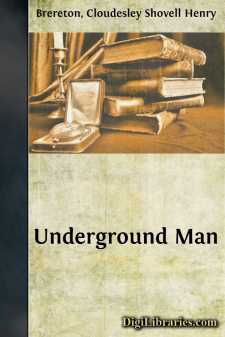Categories
- Antiques & Collectibles 13
- Architecture 36
- Art 48
- Bibles 22
- Biography & Autobiography 813
- Body, Mind & Spirit 142
- Business & Economics 28
- Children's Books 16
- Children's Fiction 13
- Computers 4
- Cooking 94
- Crafts & Hobbies 4
- Drama 346
- Education 46
- Family & Relationships 57
- Fiction 11829
- Games 19
- Gardening 17
- Health & Fitness 34
- History 1377
- House & Home 1
- Humor 147
- Juvenile Fiction 1873
- Juvenile Nonfiction 202
- Language Arts & Disciplines 88
- Law 16
- Literary Collections 686
- Literary Criticism 179
- Mathematics 13
- Medical 41
- Music 40
- Nature 179
- Non-Classifiable 1768
- Performing Arts 7
- Periodicals 1453
- Philosophy 64
- Photography 2
- Poetry 896
- Political Science 203
- Psychology 42
- Reference 154
- Religion 513
- Science 126
- Self-Help 84
- Social Science 81
- Sports & Recreation 34
- Study Aids 3
- Technology & Engineering 59
- Transportation 23
- Travel 463
- True Crime 29
Underground Man
Description:
Excerpt
PREFACE
It reflects not at all on Mr Cloudesley Brereton's admirable work of translation to remark how subtly the spirit of such work as this of M. Tarde's changes in such a process. There are certain things peculiar, I suppose, to every language in the world, certain distinctive possibilities in each. To French far more than to English, belong the intellectual liveliness, the cheerful, ironical note, the professorial playfulness of this present work. English is a less nimble, more various and moodier tongue, not only in the sound and form of its sentences but in its forms of thought. It clots and coagulates, it proliferates and darkens, one jests in it with difficulty and great danger to a sober reputation, and one attempts in vain to figure Professor Giddings and Mr Benjamin Kidd, Doctor Beattie Crozier and Mr Wordsworth Donisthorpe glittering out into any so cheerful an exploit as this before us. Like Mr Gilbert's elderly naval man, they "never larks nor plays", and if indeed they did so far triumph over the turgid intricacies of our speech and the conscientious gravity of our style of thought, there would still be the English public to consider, a public easily offended by any lack of straightforwardness in its humorists, preferring to be amused by known and recognised specialists in that line, in relation to themes of recognised humorous tendency, and requiring in its professors as the concomitant of a certain dignified inaccessibility of thought and language, an honourable abstinence from the treacheries, as it would consider them, of irony and satire. Imagine a Story of the Future from Mr Herbert Spencer! America and the north of England would have swept him out of all respect.... But M. Tarde being not only a Member of the Institute and Professor at the College of France, but a Frenchman, was free to give these fancies that entertained him, public, literary, and witty expression, without self-destruction, and produce what has, in its English dress, a curiously unfamiliar effect. Yet the English reader who can overcome his natural disinclination to this union of intelligence and jesting will find a vast amount of suggestion in M. Tarde's fantastic abundance, and bringing his habitual gravity to bear may even succeed in digesting off the humour altogether, and emerging with edification of—it must be admitted—a rather miscellaneous sort.
It is perhaps remarkable that for so many people, so tremendous a theme as the material future of mankind should only be approachable either through a method of conscientiously technical, pseudo-scientific discussion that is in effect scarcely an approach at all or else in this mood of levity. I know of no book in this direction that can claim to be a permanent success which combines a tolerable intelligibility with a simple good faith in the reader. One may speculate how this comes about? The subject it would seem is so grave and great as to be incompatibly out of proportion to the affairs and conditions of the individual life about which our workaday thinking goes on....


